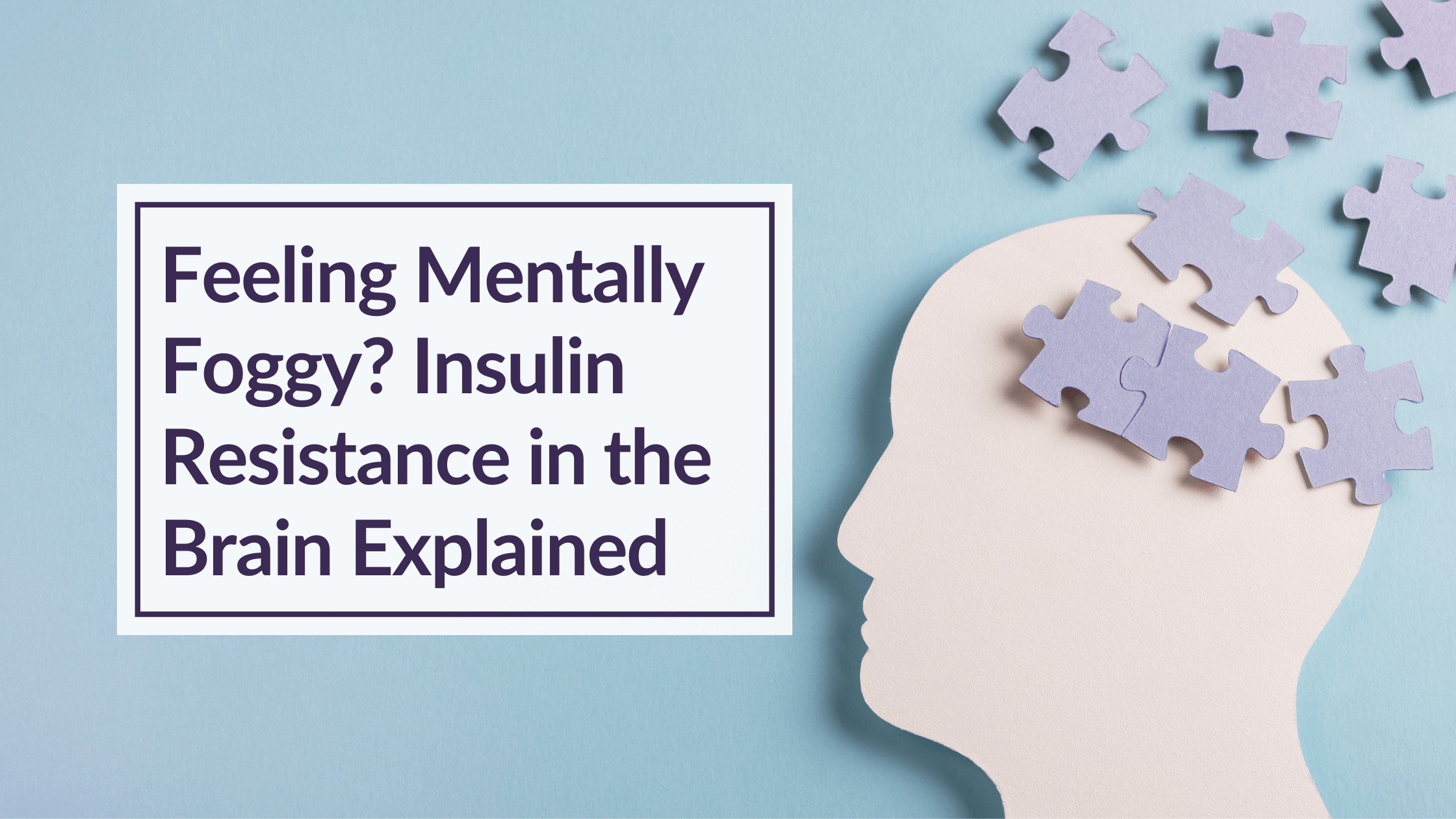
Insulin Resistance in the Brain Is Trending.
Curious about how insulin impacts your brain? You’ve likely heard about insulin in the context of blood sugar, but its influence on brain health is getting more attention.
Studies are linking insulin resistance with Alzheimer’s disease and cognitive decline. If you’re experiencing memory lapses, trouble focusing, or mood swings, it might be more than just stress or aging. These could be signs of brain insulin resistance.
Let’s look at what this means, how it affects your body, and what you can do to boost your brain health!
What is Insulin, and How Does it Work?
To understand brain insulin resistance, let’s first explore what insulin does. Produced by the Pancreas, insulin is a hormone that helps regulate blood sugar.
After eating, your body breaks down carbs into glucose, which then enters the bloodstream. Insulin unlocks cells to let glucose in for energy or storage. This keeps blood sugar levels steady.
Insulin also:
1. Balances Metabolism: Converts excess glucose into glycogen stored in the liver and muscles for later use as energy.
2. Manages Fat Storage: Stores extra energy as fat when glucose is high – which can lead to weight gain if insulin levels are chronically elevated.
3. Supports Protein Uptake: Assists in muscle growth and repair.
4. Regulates Appetite and Mood: Works with other hormones to manage hunger and mood.
And since we are talking about the brain…it also helps brain function!
5. Enhances Brain Function: Insulin controls food intake and supports memory.
What Is Insulin Resistance?
Insulin resistance happens when your cells start ignoring insulin’s signals. Think of insulin as a key that allows glucose to enter your cells. When resistance sets in, the door becomes rusty, and glucose builds up in the bloodstream. This forces the pancreas to produce more insulin, which can lead to various metabolic health issues, including:
- Type 2 diabetes
- High blood pressure
- Dyslipidemia (abnormal lipid levels)
Why Do We Get Insulin Resistance?

Several factors contribute to insulin resistance:
- Genetics: A family history of diabetes or metabolic disorders increases your risk.
- Lack of Physical Activity: Regular exercise helps cells use insulin more effectively.
- Unhealthy Eating Habits: High refined sugar and processed foods strain the insulin system.
- Chronic Stress: Long-term stress raises cortisol levels, impairing insulin sensitivity and leading to weight gain.
Insulin Resistance in The Brain
Insulin resistance in the brain occurs when the brain can’t use glucose effectively. Some researchers call this “Type 3 diabetes” due to its connection with Alzheimer’s disease.
Here’s how it works:
Beta-Amyloid Plaques: Excess insulin can lead to a buildup of beta-amyloid plaques, a hallmark of Alzheimer’s. The enzyme (insulin-degrading enzyme or IDE) that normally breaks down insulin and beta-amyloid gets overwhelmed, causing damage to brain cell connections. These connections between neurons are essential for memory and learning.
Advanced Glycation End Products (AGEs): One particularly damaging byproduct of insulin resistance is the formation of AGEs. These harmful compounds form when excess glucose attaches to proteins, altering their structure and function. AGEs can accumulate in the brain, where they increase oxidative stress and inflammation.
Recognizing Brain Insulin Resistance Symptoms
Understanding brain insulin resistance symptoms can help you identify potential issues early. Some of the signs to watch out for include:

- Memory loss or confusion.
- Difficulty concentrating or focusing.
- Mood changes, such as depression or anxiety.
- Increased appetite, particularly for sugary or carbohydrate-rich foods. The brain relies on insulin to regulate hunger signals, so resistance can lead to an overactive appetite and difficulty feeling satisfied after eating.
- Fatigue or feeling mentally “foggy.”
How Brain Insulin Resistance Symptoms Impacts the Body
In your Full Scan report, you will notice the Energetic System Performance section showcasing 14 body systems. We love to help you navigate your report and gain the understanding that many systems are linked to each other, as well as give insight to help bring them back into balance.
Disclaimer: CBH does not diagnose medical conditions with bioenergetic testing. We CAN help identify issues that may be stressing our energetic field.
Insulin resistance doesn’t just stay in the brain. Here’s how it can impact other systems:
- Nervous System:
When insulin resistance affects the brain, the Nervous System can suffer. This may lead to mood swings, anxiety, and even depression. The brain’s struggle to manage glucose also impacts neurotransmitter production, leading to potential imbalances that can affect overall mental health. - Endocrine System:
Insulin resistance in the brain can disrupt the hypothalamus-pituitary-adrenal (HPA) axis, leading to imbalances in hormones such as cortisol. This imbalance can affect stress responses and contribute to weight gain and fatigue. Additionally, brain insulin resistance may play a role in polycystic ovary syndrome (PCOS) and may also interact with other hormones, including estrogen and testosterone, impacting cognitive function. This interaction might help explain why cognitive decline often accelerates during menopause or andropause when hormone levels fluctuate. - Cardiovascular System:
Insulin resistance may contribute to atherosclerosis (hardening of the arteries) by increasing inflammation and oxidative stress. This connection to cardiovascular health means that brain insulin resistance could increase the risk of heart disease and stroke. - Digestive System:
The gut-brain axis, the communication network between your brain and gut, can be disrupted by insulin resistance. This can lead to issues like poor digestion, irritable bowel syndrome (IBS), and even changes in appetite and metabolism. - Cellular Metabolism:
Every organ system has its own set of cells. The beta cells of the Pancreas are disrupted, and insulin production is altered. The cells of the Liver are responsible for producing the teeny tiny molecules that provide the building blocks for energy production inside the cell. If the Liver is altered due to insulin resistance, there may be excess lipid or fat production, and the Liver’s glucose output may go unchecked.
8 Tips and Takeaways For Addressing Insulin Resistance in the Brain
Here are some tips to help maintain insulin sensitivity and promote cognitive well-being:
1. What You Eat is Key.
If excess sugar makes us more resistant to proper insulin utilization, it goes without saying that a balanced diet is important to consider. Eating foods with a low glycemic index (GI) helps stabilize blood sugar levels, reducing the demand for insulin and mitigating brain insulin resistance symptoms. Focus on whole, nutrient-dense foods like leafy greens, berries, nuts, seeds, and lean proteins to support both brain and metabolic health. Some health practitioners, including Dr. Dale Bredesen, a renowned neurologist and a pioneer in neurodegenerative diseases, suggest a keto diet helps reduce brain insulin resistance by lowering blood glucose levels and improving insulin sensitivity.
2. When You Eat May Help.
Fasting has been shown to enhance insulin sensitivity and promote autophagy, a process that helps clear out damaged cells, including those in the brain. Intermittent fasting, such as the 16:8 method (16 hours of fasting, 8 hours of eating), may be an effective strategy for maintaining brain health and reducing brain insulin resistance symptoms. However, it’s important to approach fasting cautiously and consult a healthcare provider, especially if you have underlying health conditions.
3. Incorporate Omega-3 Fatty Acids.
Omega-3 fatty acids, particularly DHA (docosahexaenoic acid), are vital for brain health. DHA is a key component of brain cell membranes and supports cognitive function by promoting insulin sensitivity in the brain. Add fatty fish like salmon and sardines or plant-based sources like flaxseeds and walnuts to your diet.

4. Prioritize Regular Physical Activity.
Exercise is one of the most effective ways to enhance insulin sensitivity. Aim for a combination of aerobic exercises, such as walking or swimming, and strength training to help your muscles better utilize glucose, reducing the strain on insulin.
5. Use Targeted Supplements
These include berberine, magnesium, alpha-lipoic acid, resveratrol, curcumin, chromium, and more. These supplements, when combined with a healthy lifestyle, may offer additional support in managing brain insulin resistance and maintaining cognitive function.
6. Stay Hydrated
Proper hydration is essential for maintaining metabolic functions, including insulin sensitivity. Dehydration can impair cognitive function and exacerbate insulin resistance, so aim to drink enough water throughout the day.

7. Practice Cold Exposure
Cold exposure, such as taking cold showers or cold plunging, has been linked to improved insulin sensitivity. The cold may stimulate brown fat activity, enhance glucose metabolism, and support overall metabolic health, including in the brain.
8. Engage in Cognitive Training
Cognitive training exercises, such as brain games or learning new skills, can stimulate insulin sensitivity in the brain. Challenging your brain regularly may help maintain cognitive function and support insulin’s role in memory and learning.
Addressing brain insulin resistance involves a thoughtful approach to diet, lifestyle, and supplements. By focusing on balanced nutrition, incorporating fasting when indicated, including omega-3 fatty acids, and staying active, you can support your brain’s health and maintain cognitive function.
If you want a clearer picture of your brain’s energetic health, stay tuned for a brand-new scan that will offer detailed insights into how your brain and body interact.
With these strategies, you’re not just managing symptoms—you’re taking proactive steps to enhance your brain health and protect your cognition as you age.
DISCLAIMER: Balanced Health, LLC/CBH Energetics and any parent, subsidiary, affiliated, or related entities and companies do not provide medical advice or services. This post and the bioenergetic products and services offered by Balanced Health, LLC/CBH Energetics including, but not limited to, bioenergetic tests, bioenergetic scans, bioenergetic reports and related products and services (collectively the “Bioenergetic Products and Services”) are designed for educational and informational purposes only and are not intended to diagnose, treat, cure, or prevent any disease, condition, complaint, illness or medical condition and are not a substitute for professional services or medical advice. Testing is not used for the purpose of obtaining information for the diagnosis, prevention, or treatment of disease or, the assessment of a health condition or for identification purposes.



